Mississippians
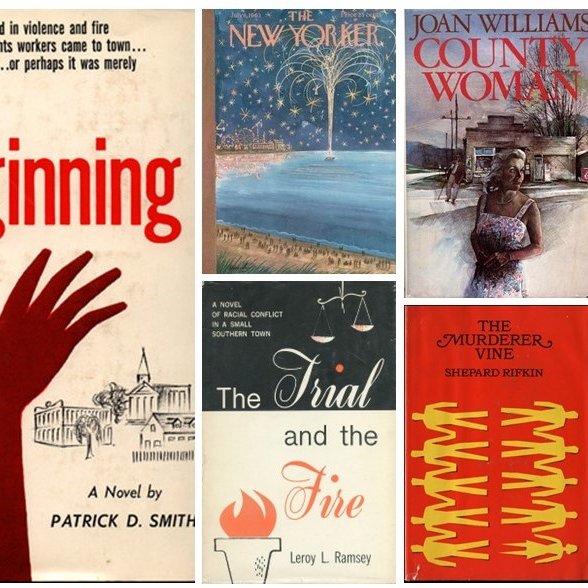
On this page:
Lewis Nordan
P. J. Parish
Leroy L. Ramsey
Shepard Rifkin
Patrick Smith
Eudora Welty
Joan Williams

Lewis Nordan, a white male attending high school in Mississippi at the time of Emmett Till's death, has placed that violent episode at the epicenter of a fantastical fable of magical realism wherein animals speak and angels roam the Delta landscape. Wolf Whistle (1993) was an American Library Association Notable Book and won the Mississippi Authors' Award for Fiction and the Southern Book Critics Circle Award for Fiction.
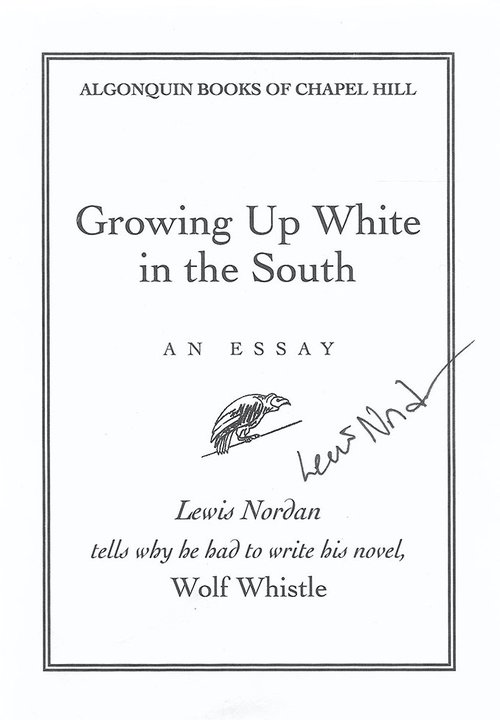
Excerpts from Nordan's essay "Growing Up White in the South"
(Chapel Hill, N.C.: Algonquin Books of Chapel Hill, 1993)
The novel that I have written is pure invention, because when I began my memory of the events surrounding the murder and the trial was very limited.
The big blank spots in my memory were something of a blessing during the writing of the book. With no memory of the identity of the persons actually involved, I was free to set the novel in my already-invented fictional geography and population of Arrow-Catcher, Mississippi.
In one area, however, I discovered myself unwilling to allow the universe of my story to wobble on its axis, let alone to spin away from it. I found myself sticking tight to the few memories I held of Emmitt Till. Other inventions came easily, but my mind would not let go of the historical Emmett. As I worked with the material, other memories came to me. In addition to his upside down body in the brush pile, I remembered his age, fourteen, a year younger than I was when he died. I remembered that he had gone into the store, where he supposedly whistled at the white woman, to buy bubble gum. I remembered that he was from Chicago, that his father was dead, that he had been visiting a great-uncle and aunt, that the uncle's name was Mose. In the early drafts of the novel, I kept all the remembered details - including Emmett's real name, Mose's real name, and much more. Eventually, my editor asked me about this impulse to preserve Emmett Till intact, as real. Why was invention so bountiful, so extravagant in fact, in all the rest of the novel, and so skimpy when it came to the character that represented Emmett Till?
It is true that I revere the memory of Emmett Till. His death marked not only a turning point in civil rights but, in a very personal way, in my own life as well. And though I usually run away and hide from comparisons with Faulkner and his old-fashioned ideas about blood-guilt, my racial identification with the murderers of Emmett Till still troubles me.
Emmett (Bobo, in the fiction) and his family are the moral, emotional, psychological, life-affirming core of this novel, which a reader may trust to be permanent, and around which all the rest of the world may go mad. The aesthetic need to maintain this solid ground was manifested in my early reluctance to change even the smallest details of my memory of the real event, including Emmett's name. Not until the last draft of the book did Emmett become Bobo - and he became Bobo in the novel only because that was the nickname by which, in real life, Emmett Till was known.
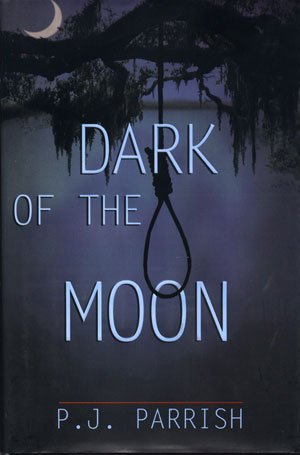
Another first novel is Dark of the Moon (1999) by P.J. Parrish, the pseudonym for a writing team of two sisters. When a hunter uncovers the bones of a lynching victim, a cop with a mixed-race heritage sets out to uncover the truth.
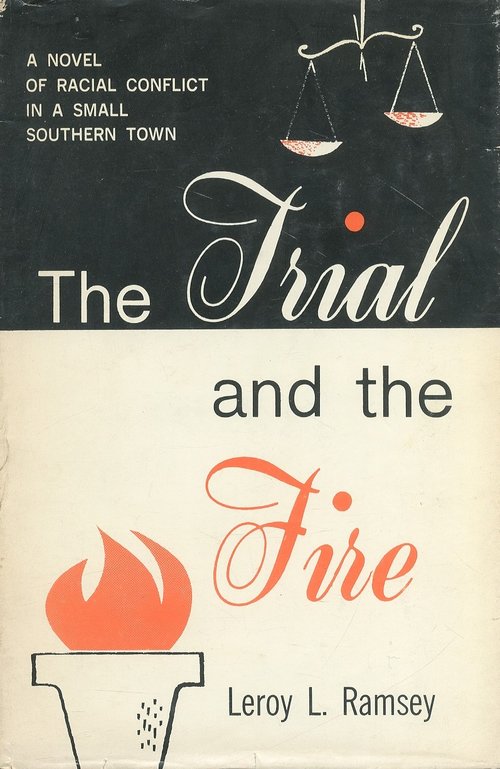
Leroy L. Ramsey was born in Meridian, Mississippi and graduated from Jackson State College before moving north. Within the pages of The Trial and the Fire (1967), he returns to his home state to explore the impact of racial integration upon both the white and black inhabitants of "Milltown."
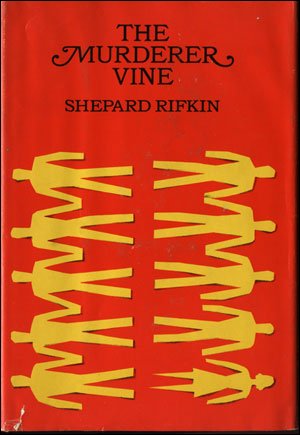
During the first weekend of Freedom Summer 1964, three civil rights workers - Michael Schwerner, James Chaney, and Andrew Goodman - disappeared. Authorities ultimately discovered their bodies outside of Philadelphia, Mississippi. The Murderer Vine (1970), by Shepard Rifkin is much more loosely based upon the three murders. In this tale, the wealthy father of one of the victims offers a New York detective one hundred thousand dollars to execute each of the five suspected killers, including the local sheriff.
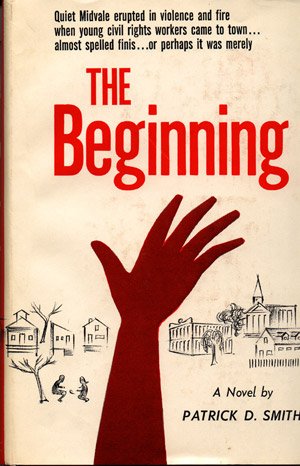
Although Patrick D. Smith is most noted for environmental novels set in Florida, his first two books take place in his native state of Mississippi. Smith wrote the second of these, The Beginning (1967), while working as the Director of Public Information at the University of Mississippi from 1962 to 1966.
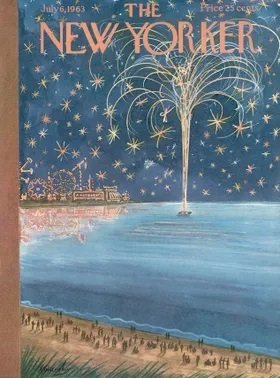
"Where is the Voice Coming From?", Eudora Welty’s short story based on the 1963 assassination of Mississippi civil rights pioneer Medgar Evers, appeared in the July 6, 1963 issue of The New Yorker. The editors had immediately accepted the story for its next issue, conducting the editing process entirely over the telephone. By that time, police had arrested Byron De La Beckwith for the crime, and Welty's story underwent alteration where details too closely resembled those of reality. About that story, Welty later wrote:
"That hot August night when Medgar Evers, the local civil rights leader, was shot down from behind in Jackson, I thought, with overwhelming directness: Whoever the murderer is, I know him: not his identity, but his coming about, in this time and place. That is, I ought to have learned by now, from here, what such a man, intent on such a deed, had going on in his mind. I wrote his story - my fiction - in the first person: about that character's point of view, I felt, through my shock and revolt, I could make no mistake. The story pushed its way up through a long novel I was in the middle of writing, and was finished on the same night the shooting had taken place."
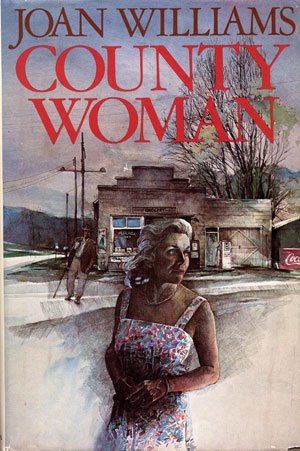
In Joan Williams' County Woman (1982), the Civil Rights Movement inspires a middle-aged white housewife from Itna Homa, Mississippi to reevaluate her life. Open to new ideas about race, class, and gender, she decides to run for the office of constable.
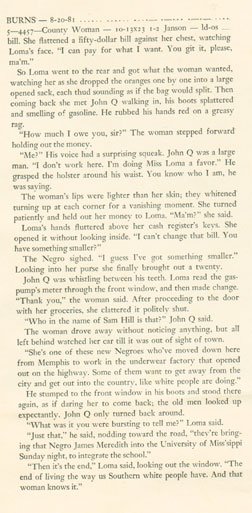
Included in the physical display were County Woman's galley proofs -- loose sheets of the printer's first trial impression of the type - and the uncorrected advance proof -- a bound copy which precedes the published first edition of the book.
